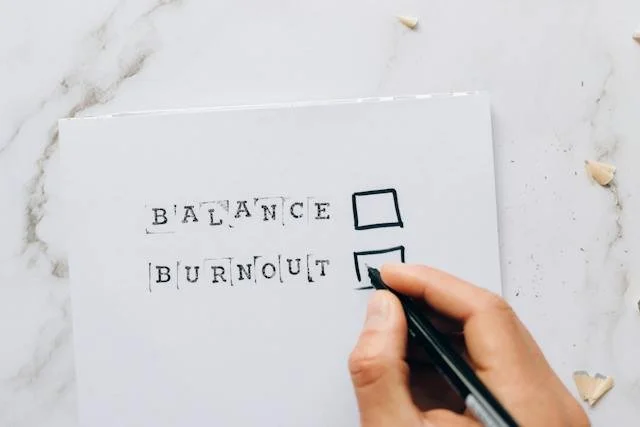Everything You Should Know If You're Considering Taking Medical Leave For Burnout
As therapists who work with high-achievers like lawyers and executives, we've seen firsthand how devastating burnout can be. It's not just a sense of dissatisfaction and lack of motivation. Burnout can cause serious health issues, not to mention damage relationships and self esteem. If you're considering taking medical leave for burnout, you probably have some questions and reservations. Here's our complete guide so you can make an informed choice.
What Burnout Really Is (And Isn’t)
Burnout is a state of emotional, mental, and physical exhaustion caused by prolonged, excessive stress. It’s common in high-responsibility roles, caregiving professions, and work cultures that reward over-functioning. Sound familiar?
Burnout is not the same as occasional stress or depression, though the symptoms can overlap. Burnout often shows up as:
Alexis Harney, LMFT
Alexis is a licensed therapist that specializes in therapy for burnout. Alexis brings a steady, grounded presence to therapy for burnout. She works with clients who are carrying heavy responsibilities and need space to breathe again. She helps people untangle stress patterns and reconnect with their strengths. Her approach to burnout treatment is supportive and practical, guiding clients toward a sustainable path of healing and balance. She works with clients virtually in California and Florida.
Emotional detachment from your work or the people around you
Feeling ineffective no matter how much effort you put in
Chronic fatigue that doesn’t improve with rest
Increased irritability or cynicism
Frequent illnesses or trouble sleeping
Emotional volatility and a sense that you can't keep going at this pace much longer
Daniella Mohazab, AMFT
Daniella specializes in therapy for burnout and supports clients who feel stuck in cycles of exhaustion. Her approach to burnout therapy combines warmth with practical strategies, helping people rebuild energy and resilience. If you’re looking for effective burnout treatment that addresses both the emotional and physical toll of stress, Daniella offers care that makes lasting change possible. She works virtually with clients in California.
Ask yourself:
Do I dread waking up to go to work, even after a weekend off?
Have I stopped feeling anything about things I used to care about?
Is my body showing signs of stress that won’t go away with time off?
If the answer to these questions is yes, it may be time to take your symptoms seriously.
Considering Medical Leave for Burnout
Medical leave is time off from work that's legally protected when you’re dealing with a serious health issue. It doesn't matter if the health issue is physical, mental, or a combination of the two. Burnout is usually a bit of both. In the U.S., many employees are protected under the Family and Medical Leave Act (FMLA), which allows up to 12 weeks of unpaid, job-protected leave per year for eligible workers.
Some employers and states also offer paid medical leave or short-term disability benefits that can support you financially while you recover.
When Burnout Justifies Taking Time Off
Burnout is a real and a legitimate health concern. If your burnout is bad enough, you should absolutely take leave if possible. To take leave, you’ll usually need a diagnosis from a licensed provider (like a therapist, psychiatrist, or physician) and documentation showing that your condition prevents you from working effectively.
If your symptoms are interfering with your ability to focus, complete tasks, communicate, or manage basic self-care, that’s a sign your burnout has crossed into medical territory.
The Importance Of Seeing A Doctor ASAP
Seeing a doctor as soon as the possibility of taking leave enters your mind is your best shot at paperwork going smoothly. We know the state of healthcare in the US means this may not be possible. But if you can, try to see a doctor ASAP. An in-person visit is sometimes required for certain types of documentation, but if telehealth is all you can get, take it.
How to Talk to Your Doctor About Burnout
Be honest and specific about your symptoms. Tell your provider:
How long you’ve felt this way
How it’s affecting your daily life and job performance
Any physical symptoms like sleep disruption, panic, or illness
What you've tried so far
Many providers are familiar with writing leave letters or filling out FMLA paperwork. If yours isn’t, a therapist or psychiatrist can often guide you through this process and provide referrals or documentation.
Approaching Burnout Leave With Work
How to Request Medical Leave
Start with your HR department, if you have one. Ask for the proper paperwork or policies around taking medical leave. You don’t need to disclose your diagnosis, just that your healthcare provider recommends medical leave due to a serious health condition.
It helps to:
Keep communication professional and minimal
Submit your documentation promptly
Set up an out-of-office plan if you’re able, or work with a trusted colleague to do so
You are not required to explain your trauma history, mental health diagnosis, or treatment plan. In fact, you probably shouldn't. In most cases, all that’s needed is a provider's note stating that you are currently unable to work due to a health condition and need time off. Honestly, the less information you give, the better.
If you're unsure, a therapist can help you plan what to say (and not say).
FMLA and Other Leave Options
Here are a few options to explore:
FMLA: Up to 12 weeks of job-protected unpaid leave for eligible employees
Short-term disability insurance: Often covers 60–70% of your income for several weeks if your employer offers this
State-specific leave programs: Some states (like California) have additional benefits that are easy to access if you have a responsive doctor
Employer leave policies: Your HR handbook may include paid medical leave options
Long-term disability insurance. If your employer offers this, or if you've taken out an individual policy, this can cover a large portion of your income if you need more than 8-12 weeks of time off.
How Much Leave Should You Take To Recover From Burnout?
This depends on the severity of your burnout, how resilient you are, and how committed you are to building new habits and a new mindset. We recommend at least a month for moderate burnout. When in doubt, take more than you think you need, if you can afford it. You can always return early if you feel ready.
Planning Ahead Financially
Disability and Leave Benefits
If your leave is unpaid under FMLA, you might still be eligible for short-term disability benefits through your employer or state. You’ll usually need to apply with medical documentation and may experience a delay before benefits start.
Can You Afford to Take Leave? A Financial Checklist
To prepare financially:
If you're in California and have a provider who can file SDI paperwork for you in a timely manner, this process is generally quite smooth. This covers about 60% of your W2 wages/salary for up to a year of leave. Your doctor will need to refresh the paperwork every month or so, and that means you'll likely need at least a telehealth visit each month.
Review your current savings and expenses.
Check whether your employer offers paid time off or disability insurance.
Talk to a financial advisor or planner if needed.
Talk to your partner or spouse, of course! Money is often a trigger for conflict with couples, so don't keep them in the dark until you've made a decision.
Burnout recovery may cost time and money, but continuing without a break can cost even more. You deserve the time off you need to heal.
What To Do While On Leave For Burnout
Medical leave isn’t about escaping work stress, it’s about healing. This is your chance to:
Rest without guilt
Begin or deepen your therapy work
Reconnect with parts of your identity outside your job
Build a more sustainable lifestyle
Creating a Recovery Plan While You're Off
Recovery isn’t passive. Try to create a gentle structure for your time off:
Schedule regular therapy and medical check-ins
Make space for rest and joy
Rebuild routines that support your mental and physical health.
An Ideal Burnout Recovery Plan
The four layers of holistic healing should be applied to your burnout recovery.
Every day you're on leave, you need to create a balance of rest and structure. To do this, we recommend that you focus on just four tasks a day.
Tend To Your Mental Health. This could include a variety of tasks, such as mindfulness, therapy, attending a support group, or reading more about burnout recovery.
Tend To Your Physical Health. This must include some kind of movement like walking, hiking, yoga, swimming, dancing, or something else that feels good. It doesn't need to be super intense, it just needs to happen every day. Tending to your physical health may also include taking prescribed medications as directed, gentle nutrition, and good sleep.
Tend To Your Social Health. Talk to a friend or someone you'd like to deepen your connection to. Strong social connections are the cornerstone of physical health and longevity.
Connect With Something That Gives You Meaning. This could be art, your community, spirituality, or a cause you're passionate about. Don't overcommit yourself or go too hard. But connecting with something that brings you meaning is vital to your recovery.
What Not To Do During Leave
Don't Jump Into Life Maintenance Tasks ASAP. Yeah, we know you need to renew your passport and get an oil change and return those Amazon purchases. But they can wait a few weeks, we promise. Staying too busy delays your healing.
Don't Overbook Yourself. We know you want to see friends, go to personal appointments, take a trip, etc. But keep things simple. No more than one thing on your schedule per day.
Don't Use Leave For Something Else. You're taking leave for recovery, not just to hit pause. If you focus on other things, you won't recover.
Don't Let Go Of Structure Completely. Keeping things simple is not the same as having no plan. Keep a regular sleeping, eating, and moving schedule.
Creating New Habits During Burnout Recovery Leave
What got you into this situation is not what will get you out. Don't focus on productivity and use this just as a work pause. You need to create completely new habits and a new mindset. Life shouldn't be about running yourself into the ground. Even if you are passionate about your work, work should facilitate you living a life you love, not detract from it.
Working with a therapist to support your burnout recovery can provide a needed perspective when identifying the habits and mindset that contribute to burnout. A skilled therapist can gently point out things that aren't working and develop new ways of approaching work and your personal sense of worthiness.
Setting Boundaries So You Don’t Slide Back Into Burnout
Don’t check work emails. Don’t “just hop on a call.” It’s OK to go quiet. In fact, it's what's legally required during FMLA. If work is bothering you, they legally should not be. A complete break is what you need to do to allow yourself to recover. Setting strong boundaries during leave models a new way of showing up for yourself, and lays the foundation for a healthier return to work. Toward the end of your leave, work may check in about your return date. But they shouldn't bother you before that.
Therapy For Burnout In California, Florida, & Beyond
If you're considering medical leave for burnout, chances are you probably need it. Knowing your limits is a strength. You deserve time and care to heal.
Our therapists specialize in helping high-achievers find relief through therapy for burnout. Whether you’re overwhelmed by work, struggling with perfectionism, or simply exhausted, our team provides compassionate and effective burnout therapy. We offer evidence-based burnout treatment tailored to your needs so you can restore balance and feel like yourself again.
If you're not sure whether you're ready to take leave or want someone to talk through your next steps, therapy can help. We support professionals dealing with burnout and can walk with you through whatever phase of healing you're in. Book a free consultation today.
If burnout has left you feeling emotionally depleted, disconnected, or unsure how to slow down without everything falling apart, individual therapy can help you reset in a sustainable way. Our therapists take a holistic therapy approach that looks at stress, boundaries, identity, and nervous system regulation, not just productivity or coping harder. Therapy can help you recover energy, clarify priorities, and build a life that does not require constant self-sacrifice. We also specialize in trauma therapy and EMDR therapy; we offer EMDR therapy and trauma therapy to help process the deeper patterns that keep burnout cycling. We provide EMDR therapy in Los Angeles, San Francisco, and Santa Cruz, along with online sessions across California.



















